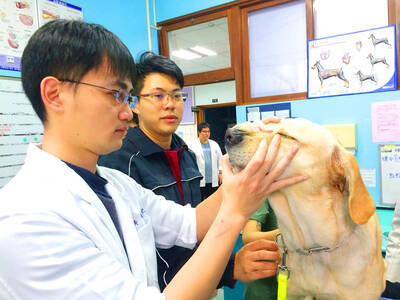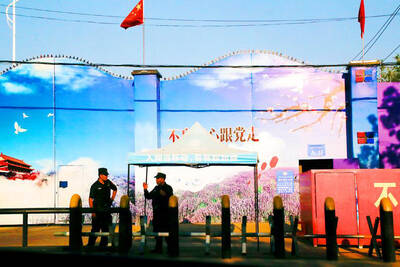The Philippine Food and Drug Administration (FDA) was willing to collaborate with Taiwan on COVID-19 vaccine regulations, but did not commit to issuing emergency use authorization (EUA) of a Taiwanese-made vaccine, according to a letter from the agency to a Taiwanese drugmaker in January.
Taiwanese media on Tuesday reported that the agency had written to a Taiwanese biotech company and declared its willingness to allow for the use of a Taiwanese COVID-19 vaccine once it received an EUA in Taiwan.
Some local reports also indicated that the Philippines was interested in procuring the vaccines as long as they obtained an EUA in Taiwan.
Philippine presidential spokesman Harry Roque and Philippine vaccine czar Carlito Galvez Jr denied the reports to Manila-based broadcaster ABS-CBN.
The reports quickly drew attention in Taiwan, with some saying they worried the issue could affect Taiwan-Philippines relations.
The Presidential Office said that the Philippine government has not made any request regarding Taiwan’s as-yet unauthorized COVID-19 vaccines, and the office has asked media to correct their erroneous reports.
A copy of the letter, dated Jan. 21, obtained by the Central News Agency said: “The [Philippine] FDA recognizes the accomplishments and contributions of the TFDA [Taiwan’s FDA] in drug regulation. The FDA is open for collaboration in different aspects of drug regulations.”
A source from the Philippine government on Thursday said that the letter was a response to a Taiwanese vaccine company’s inquiries on whether the agency would recognize its Taiwanese counterpart as a competent authority.
The agency only expressed openness to work with the Taiwanese FDA on the matter of vaccine regulations, but did not make any commitments to that effect, the source said.
At least two Taiwanese biotech firms are expected to roll out COVID-19 vaccines in the coming months. Neither has started phase 3 clinical trials nor have they received an EUA in Taiwan.
Opposition parties have voiced concerns that the government might be rushing to approve domestically developed vaccines, and that EUAs for them would be granted even though they have not yet started phase 3 trials.
President Tsai Ing-wen’s (蔡英文) administration has said that local vaccines must meet the government’s safety and efficacy standards before they are granted an EUA.
The Chinese Nationalist Party (KMT) on Thursday issued a statement demanding that the government investigate news outlets reporting on the letter to determine if they had intentionally disseminated disinformation, especially as Tsai’s administration has been threatening to prosecute anyone spreading false information during the COVID-19 pandemic.
“During the pandemic, the Tsai government has been warning the public not to spread misinformation, and contraveners could face a fine of up to NT$3 million [US$107,875]. We call on the Tsai administration to investigate the possible spread of misinformation that might have to do with domestic propaganda or the manipulation of stock prices for a specific company,” the KMT said.

Former Czech Republic-based Taiwanese researcher Cheng Yu-chin (鄭宇欽) has been sentenced to seven years in prison on espionage-related charges, China’s Ministry of State Security announced yesterday. China said Cheng was a spy for Taiwan who “masqueraded as a professor” and that he was previously an assistant to former Cabinet secretary-general Cho Jung-tai (卓榮泰). President-elect William Lai (賴清德) on Wednesday last week announced Cho would be his premier when Lai is inaugurated next month. Today is China’s “National Security Education Day.” The Chinese ministry yesterday released a video online showing arrests over the past 10 years of people alleged to be

THE HAWAII FACTOR: While a 1965 opinion said an attack on Hawaii would not trigger Article 5, the text of the treaty suggests the state is covered, the report says NATO could be drawn into a conflict in the Taiwan Strait if Chinese forces attacked the US mainland or Hawaii, a NATO Defense College report published on Monday says. The report, written by James Lee, an assistant research fellow at Academia Sinica’s Institute of European and American Studies, states that under certain conditions a Taiwan contingency could trigger Article 5 of NATO, under which an attack against any member of the alliance is considered an attack against all members, necessitating a response. Article 6 of the North Atlantic Treaty specifies that an armed attack in the territory of any member in Europe,

LIKE FAMILY: People now treat dogs and cats as family members. They receive the same medical treatments and tests as humans do, a veterinary association official said The number of pet dogs and cats in Taiwan has officially outnumbered the number of human newborns last year, data from the Ministry of Agriculture’s pet registration information system showed. As of last year, Taiwan had 94,544 registered pet dogs and 137,652 pet cats, the data showed. By contrast, 135,571 babies were born last year. Demand for medical care for pet animals has also risen. As of Feb. 29, there were 5,773 veterinarians in Taiwan, 3,993 of whom were for pet animals, statistics from the Animal and Plant Health Inspection Agency showed. In 2022, the nation had 3,077 pediatricians. As of last

XINJIANG: Officials are conducting a report into amending an existing law or to enact a special law to prohibit goods using forced labor Taiwan is mulling an amendment prohibiting the importation of goods using forced labor, similar to the Uyghur Forced Labor Prevention Act (UFLPA) passed by the US Congress in 2021 that imposed limits on goods produced using forced labor in China’s Xinjiang region. A government official who wished to remain anonymous said yesterday that as the US customs law explicitly prohibits the importation of goods made using forced labor, in 2021 it passed the specialized UFLPA to limit the importation of cotton and other goods from China’s Xinjiang Uyghur region. Taiwan does not have the legal basis to prohibit the importation of goods